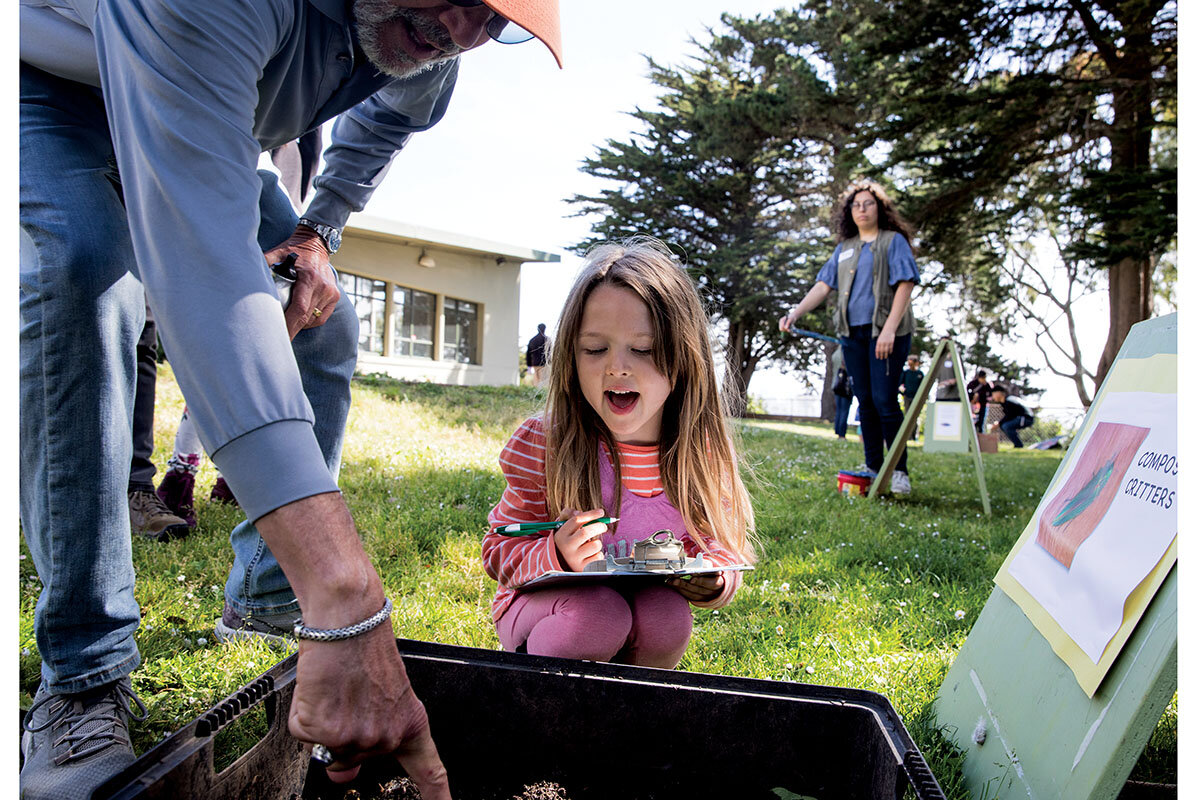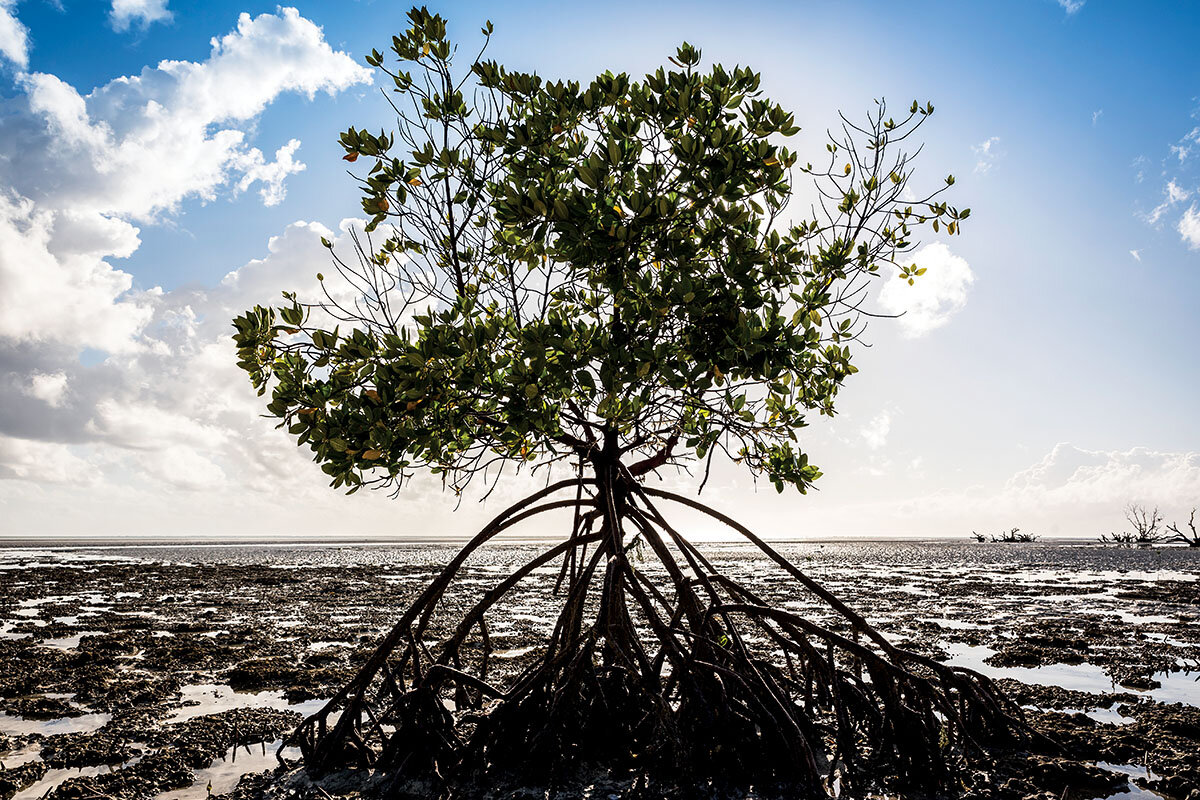Generosity for children, from wartime schooling to music education
Loading...
In more cases of leading by example, San Francisco is teaching other cities how its well-established composting program works. And in southeastern Africa, women have been patiently reforesting the shoreline with mangroves for 15 years.
1. United States
San Francisco, an early adopter of urban composting, now serves as a model for others around the world. The city conducted a “waste characterization” study in 1996 that showed a third of the refuse could be composted, which experts say is one of the simplest, most low-tech ways to combat climate change by reducing methane production. More than 500 tons of compost are collected each day, eliminating around 80% of waste from landfills. Over 135 countries have sent delegations to learn from San Francisco.
Why We Wrote This
In our progress roundup, some adult Ukrainian refugees in Poland made normality a priority for children escaping the war, by creating a new school in Warsaw. And for one virtuoso pianist, his growing venture is sharing music with schools that have slim resources for the arts.
When composting and recycling became mandatory in 2009, the city’s waste management company, Recology, offered compost pails, labels, signs, tool kits, and training to residents and businesses. One particularly effective strategy has been getting children involved. “The best way to get adults to compost is to get composting programs running in schools,” said Recology public relations manager Robert Reed. “Those kids go home and say, ‘Why don’t we compost at home?’” A facility turns food scraps into high-quality compost, affectionately called “black gold,” which is then sold to local farms, orchards, and vineyards to offset program costs.
Source: Reasons To Be Cheerful
2. Poland
Students from war-torn Ukraine were able to finish the school year in Warsaw – at a school created just for them. Since conflict broke out, nearly 7 million refugees have fled Ukraine, with over half landing in neighboring Poland. In March, a group of Ukrainian educators came together to found the Warsaw Ukrainian School, staffed entirely by Ukrainian refugees and serving 270 students. Switching to the Polish curriculum can set students back in their education, so these students follow the Ukrainian curriculum, while learning Polish to integrate into local life.
Operating out of an unused college building in southwestern Warsaw, the school prioritized admission for students whose schools had been destroyed. “We decided that we will take children from the hottest points of Ukraine, like Mariupol, like Bucha, like Izum,” said deputy director Oksana Vakhil. When the students first started, “I saw just empty eyes,” she said.
Since then, and with the support of mental health staff and teachers trained to identify and address trauma, students have come to feel at home in their new school. “We have just a little piece in Warsaw, a little piece of Ukraine,” said 15-year-old Diana Norchak.
Source: NPR
3. Pakistan
A safe, new bus system means more women are traveling independently in Peshawar, Pakistan. A 2016 survey found that 90% of women in the city felt unsafe using public transport, with harassment often deterring them from studying or joining the workforce. Inadequate public transportation contributes to the country having one of the lowest female workforce participation rates in the world. But since the launch of the Bus Rapid Transit system in 2020, the percentage of female bus travelers has grown from 2% to 30%. The buses reserve a quarter of the seats for women and are equipped with CCTV cameras and guards. Bus stations are well lit, and the BRT has hired more female employees.
Experts say there’s still room to make sure women feel safe traveling to and from home, given poor street lighting, limited pedestrian infrastructure, and a lack of law enforcement in secluded areas. But the new buses, which are cheaper and often faster than alternative forms of transport, have made a significant difference. “I was never allowed to use public transport alone. When I got married, I would wait for my husband to take me to the market since I was scared of going out unaccompanied,” said Madiha Shakir, who recently began using the bus system. “I can’t tell you how liberating it has been for me.”
Source: Thomson Reuters Foundation
4. Mozambique
Women in coastal Mozambique replanted 125 hectares of mangroves damaged by flooding. In 2000, floods caused by Tropical Cyclone Eline destroyed half of the mangroves in the estuary where the Limpopo River opens to the Indian Ocean. Over the past 15 years, women from nearby communities have been working to restore the delicate mangrove ecosystem, which provides communities access to small fish, crabs, and wood while reducing erosion, filtering seawater, and absorbing atmospheric carbon.
It can take decades for mangroves to mature, but trees planted in the past five to 10 years now stand over 2 meters (6 1/2 feet) tall. Planting is best done during the spring tides, and an additional 400 hectares (988 acres) are needed to restore the gnarled trees to their original coverage. The project was initiated by Mozambique’s National Agency for Environmental Quality Control and is currently funded through the Nairobi Convention, an agreement among 10 countries to protect the Western Indian Ocean.
Source: Hakai Magazine
World
“Piano labs” are opening in schools in several countries, preserving access to music education in underserved areas. Music programs are often targeted for budget cuts in resource-stretched public schools. So Chinese superstar pianist Lang Lang, whose 2019 “Piano Book” was the bestselling classical album of the year, looked to fill in the gaps.
The Lang Lang International Music Foundation provides keyboards, curriculum, teacher training, and grants to public schools serving low-income students, with the conviction that music “heals, unites and inspires, and it makes us better people.” So far, the team has opened 104 piano labs in China and 84 in the United States, giving piano access to over 180,000 students, generally between the ages of 7 and 12. The model is now expanding to the United Kingdom.
Source: The Guardian









